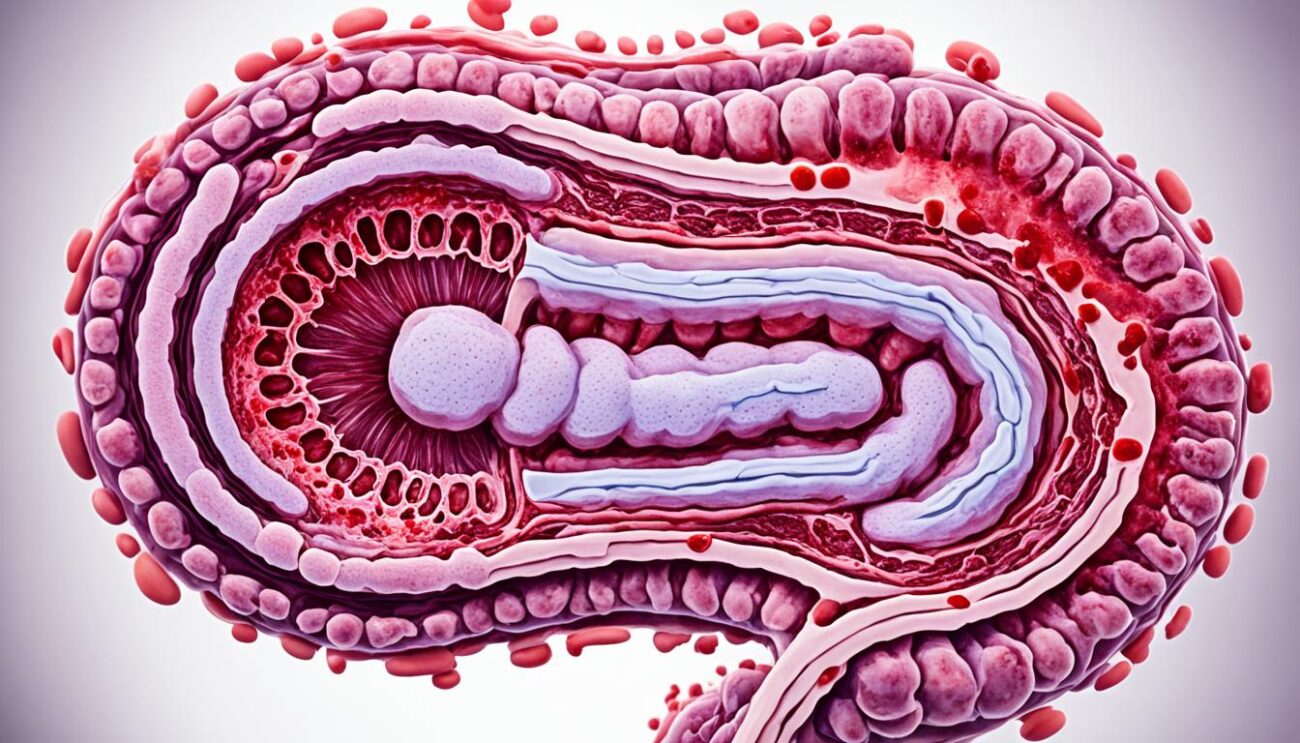Imagine a condition that affects nearly 1 million Americans, causing chronic inflammation and ulcers in their large intestine. This is the reality for those living with ulcerative colitis, the most common form of inflammation of bowel . While there is no cure, understanding the causes, signs, symptoms, and diagnostic process can empower you to better manage this often debilitating condition.

Key Takeaways
- Ulcerative colitis is an inflammatory bowel disease that causes chronic inflammation and ulcers in the large intestine.
- Symptoms can include diarrhea, bloody stools, abdominal pain, and weight loss.
- Genetic factors, immune system dysfunction, and environmental influences are believed to play a role in the development of ulcerative colitis.
- Diagnostic tests may include blood tests, stool tests, and endoscopic procedures to examine the colon.
- Treatment typically involves medications to reduce inflammation, and in some cases, surgery may be necessary.
What is Ulcerative Colitis?
Ulcerative colitis is a chronic disease that causes inflammation and ulcers in the colon’s lining. It has flare-ups and remissions, with symptoms that can change in severity.
Definition and Overview
This condition affects the colon’s inner lining, leading to inflammation and sores or ulcers. It can make the colon work poorly and cause symptoms like stomach pain, diarrhea, and bleeding from the rectum.
Prevalence and Demographics
About 1 million Americans have ulcerative colitis, making it the most common inflammatory bowel disease. It often starts before people turn 30. People of Ashkenazi Jewish or white European descent are more likely to get it. It’s less common in those of Asian descent. Both men and women can get it.
Ulcerative colitis is a complex condition that affects life quality. Knowing about it helps in managing its challenges.
Ulcerative Colitis its causes signe and symptoms and diagnoses
Ulcerative colitis is a chronic disease that affects the colon’s lining. It’s not clear why it happens, but it seems to be caused by a mix of genes and environmental factors. These factors trigger an abnormal immune response, causing inflammation and damage in the colon.
Symptoms include diarrhea with blood and mucus, stomach pain, and feeling very tired. You might also lose weight, have rectal bleeding, and feel feverish, nauseous, or vomit. How bad these symptoms are can vary a lot from person to person.
To diagnose ulcerative colitis, doctors look at your medical history, do a physical check-up, and run tests. They might use colonoscopy or sigmoidoscopy to see inside your colon and take tissue samples. This helps confirm the diagnosis and rule out other conditions.
| Ulcerative Colitis Key Facts | Data |
|---|---|
| Annual provider visits in the US | Quarter-million |
| Annual medical costs in the US | Over $4 billion |
| Incidence per 100,000 persons per year | 9 to 20 cases |
| Prevalence per 100,000 persons per year | 156 to 291 cases |
| Age of onset | 15-30 years and 50-70 years |
| Smoking’s impact | Protective, with milder disease |
| Appendectomy risk reduction | 69% |
| Incidence in Westernized environments | Higher in Northern Europe and North America |
| Proctitis at presentation | 30% to 60% |
| P-ANCA positivity | 60% to 70% |
Environmental factors also seem to affect ulcerative colitis, along with genetics and the immune system. Researchers are still studying how these factors interact to cause the disease.
Spotting ulcerative colitis early and accurately is key. It helps doctors choose the right treatment. This can ease symptoms, prevent serious problems, and improve life quality for those with the disease.
Symptoms of Ulcerative Colitis
Ulcerative colitis is a chronic condition that causes inflammation in the digestive tract. It can lead to many symptoms that can really affect a person’s life. These symptoms include stomach pain, diarrhea, bloody stools, and more.
Common Symptoms
People with ulcerative colitis often have:
- Diarrhea, often with blood or mucus
- Abdominal cramps and pain
- Urgency and frequency of bowel movements
- Rectal bleeding
- Fatigue
- Unintentional weight loss
Severity of Symptoms
The symptoms of ulcerative colitis can vary a lot from one person to another. Some may have mild symptoms with less than four bowel movements a day and occasional blood in their stool. On the other hand, severe cases can have more than 10 bloody bowel movements a day.
Other symptoms like fever, nausea, vomiting, and more widespread inflammation are more common in severe cases. It’s important to understand these symptoms to manage the disease better and improve life quality. Working with healthcare providers helps create treatment plans that fit each person’s needs.
Causes of Ulcerative Colitis
The exact cause of ulcerative colitis is still a mystery, but it likely involves both genes and environment. About 1.4 million Americans deal with inflammatory bowel disease, and ulcerative colitis hits Caucasians more often. It usually starts between 15 and 30 years old, and it doesn’t favor one gender over the other.
Genetic Factors
Genes play a big part in getting ulcerative colitis, as it can run in families. Around 8–14% of UC patients have a family history of IBD, and those with Ashkenazi Jewish roots are more likely to get it. Some genes are linked to a higher risk, but how they do it is still a puzzle.
Immune System Dysfunction
An immune system glitch, where it attacks the colon lining, is a main cause of inflammation and damage in ulcerative colitis. Antibiotics like Flagyl, Cipro, and Rifaxamin help fight off small intestine bacteria that keep inflammation going. Also, oral birth control pills have been linked to a higher risk of IBS, which might help cause ulcerative colitis.
We don’t know all the causes of ulcerative colitis, but genes and immune issues are key. Knowing these factors is key to better diagnosing and treating this tough condition.
Diagnosis of Ulcerative Colitis
Diagnosing ulcerative colitis involves looking at your medical history, physical check-up, and different tests. Your doctor will first take a detailed look at your past health to understand your symptoms, when they started, and what might have caused them.
Medical History and Screening Tests
Your doctor might order some tests to confirm if you have ulcerative colitis. Blood tests can check for anemia or signs of infection and inflammation. Stool studies can look for white blood cells or certain proteins that show the condition is there.
Endoscopic Procedures and Biopsies
To really know if you have ulcerative colitis, your doctor will use endoscopic tests like a colonoscopy or sigmoidoscopy. These tests let your doctor see the lining of your colon and take tissue samples for biopsy. This condition usually starts at the rectum and can move up the colon. So, a colonoscopy is key for a full check-up. Sometimes, a flexible sigmoidoscopy is used to look at the lower colon if it’s very inflamed.
If your case is severe, your doctor might also order X-rays or CT scans to check for things like a megacolon or a perforated colon. They might also use CT enterography or MR enterography to see if there’s inflammation in your small intestine.
By looking at your medical history, doing screening tests, and using endoscopic procedures, your healthcare team can accurately diagnose ulcerative colitis. They can then make a plan to help manage your condition.
“Endoscopic procedures with tissue biopsy are the definitive method to diagnose ulcerative colitis.”
Treatment Options for Ulcerative Colitis
Living with ulcerative colitis can be tough, but there are many ways to help manage it. The main way to treat it is with medicines. These can be anti-inflammatory drugs, immune system suppressants, or targeted biologics. If medicines don’t work or the disease is very bad, surgery might be needed to fix or remove the affected part of the colon.
Doctors often prescribe aminosalicylates, corticosteroids, and immunomodulatory medications for ulcerative colitis. These drugs help reduce inflammation and ease symptoms. The aim is to get into remission and stay there. For severe or hard-to-treat cases, biologic therapies might be an option.
If medicines don’t work or if there are serious problems like bleeding or cancer, surgery might be considered. Surgery can be a big step, like removing the colon and rectum or creating a new way for waste to leave the body.
The right treatment plan depends on the person’s symptoms, how bad the disease is, and how they react to treatments. Working closely with a gastroenterologist is key to finding and changing the best treatment.

Coping with Ulcerative Colitis
Living with ulcerative colitis can be tough, but you can manage it better. Making changes to your diet and handling stress well are key. These steps help with both the physical and emotional sides of this condition.
Dietary Modifications
When you’re having a flare-up, watch what you eat. Stay away from foods high in fiber or those that might irritate your gut. Eating smaller meals often and drinking plenty of water can ease your symptoms. Keeping a food diary can show you which foods make things worse.
Stress Management Techniques
Stress can make ulcerative colitis worse. Doing regular exercise like yoga or meditation can lessen stress and boost your health. Talking to a therapist or joining a support group can also help with the emotional side of this condition.
These tips can help, but don’t forget to follow your doctor’s advice. Working with your healthcare provider is key to managing your ulcerative colitis well.
| Dietary Modifications | Stress Management Techniques |
|---|---|
|
|
“Stress management and dietary changes can be powerful tools in managing the symptoms of ulcerative colitis, alongside medical treatment.”
By using dietary changes and stress management, you can play a big part in handling ulcerative colitis. This can make your life better.
Complications and Risks
Ulcerative colitis is a chronic disease that can cause serious problems if not treated well. About 1 in 3 people with ulcerative colitis may get inflammation in other body parts. This can lead to eye and skin issues, and slow growth in kids. It also raises the chance of osteoporosis and primary sclerosing cholangitis, a serious liver condition.
One big worry is the higher risk of colorectal cancer. People with this condition, especially those with severe cases, may get this cancer over time. Regular check-ups and monitoring are key to catch early signs or cancer.
Severe dehydration, colon perforations, and toxic megacolon, a serious issue, are dangers of uncontrolled ulcerative colitis. Quick medical help and proper care are vital to avoid these risks and stay healthy.

Ulcerative colitis also affects mental and emotional health. Its chronic nature, unpredictable flare-ups, and ongoing treatment can lower quality of life. But, with stress management and support, people can better handle the condition.
Knowing the risks of ulcerative colitis helps people work with their healthcare team. A good plan that covers both physical and emotional needs is key. Staying on top of treatment and being proactive can lessen the disease’s effects and improve long-term health.
Ulcerative Colitis Research and Advancements
Ulcerative colitis research has made big strides in recent years. Scientists are working hard to understand how genes, the immune system, and gut bacteria interact. These studies are helping us find new ways to treat and maybe even cure this tough condition.
Researchers are looking closely at genes linked to ulcerative colitis. They’ve found many genes that increase the risk, especially in certain groups like Ashkenazi Jews. They’re also studying how the immune system and gut bacteria interact. This could be key to understanding why inflammation happens in ulcerative colitis.
Scientists are also working on new treatments for ulcerative colitis. They’re looking at biologic agents and small molecules that can target inflammation. This could lead to better treatments for patients.
Even with progress, there’s still a lot to learn about ulcerative colitis. Studies and clinical trials are crucial to keep improving our understanding. They aim to give patients better, more personal treatments for this condition.
The future looks bright for ulcerative colitis research. With hard work from researchers and doctors, we can expect more exciting discoveries and new treatments. This will help people living with the condition a lot.
Conclusion
Ulcerative colitis is a tough condition that affects many Americans. Recent years have seen big steps forward in understanding and treating it. Knowing the symptoms, like diarrhea with blood or mucus, helps you work with your healthcare team for the right treatment plan.
The exact reasons for ulcerative colitis are still being studied. But, research points to genetics and immune system issues as possible causes. Getting an accurate diagnosis is key, using history, tests, and endoscopies. Luckily, there are many treatments available, including medicines and surgery in some cases.
Managing symptoms and reducing inflammation is key. This helps prevent serious issues like a higher risk of colorectal cancer. By being active in your care, you can aim for long-term remission. Regular check-ups and working with your healthcare team are vital for staying healthy. As research goes on, expect better treatments and a better life ahead. Understanding ulcerative colitis helps you manage it and live well.
